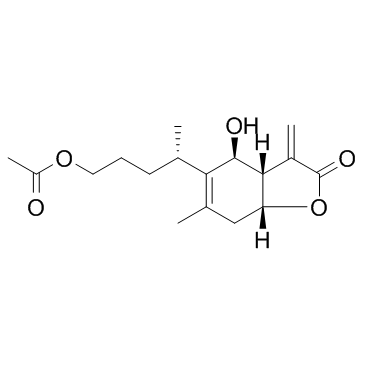Inulicin (1-O-Acetylbritannilactone) (Synonyms: ABL, Inulicin) |
| Catalog No.GC33861 |
La inulicina (1-O-acetilbritannilactona) (1-O-acetilbritannilactona) es un compuesto activo que inhibe la activaciÓn de Src y FAK mediada por VEGF.
Products are for research use only. Not for human use. We do not sell to patients.

Cas No.: 33627-41-7
Sample solution is provided at 25 µL, 10mM.
Inulicin (1-O-Acetylbritannilactone) is an active compound isolated from Inula Britannica L. Inulicin (1-O-Acetylbritannilactone) inhibits VEGF-mediated activation of Src and FAK. Inulicin (1-O-Acetylbritannilactone) inhibits LPS-induced PGE2 production and COX-2 expression, and NF-κB activation and translocation.
Inulicin (1-O-Acetylbritannilactone) inhibits angiogenesis and lung cancer cell growth through regulating VEGF-Src-FAK signaling. Inulicin dose-dependently inhibits vascular endothelial growth factor (VEGF)-induced proliferation, migration, and capillary structure formation of cultured human umbilical vascular endothelial cells (HUVECs). Treatment of A549 NSCLC cells with Inulicin results in cell growth inhibition and Src-FAK in-activation. The potential effect of Inulicin is tested ton Src and FAK phosphorylation in A549 lung cancer cells. Significant high levels of Src and FAK phosphorylations are noticed a in A549 cells, which are both inhibited by treatment of Inulicin (5 μM and 10 μM). Src and FAK are both important for cancer cell proliferation. Thus, A549 cell growth, tested by MTT assay and clonogenicity assay,is remarkably inhibited by corresponding Inulicin treatment. The anti-A549 cell growth activity of Inulicin is again dose-dependent[1]. Inulicin (1-O-Acetylbritannilactone) isolated from Inula britannica-F., inhibits inflammatory responses in vascular smooth muscle cells (VSMCs). Inulicin (5, 10, 20 μM) has several concentration dependent effects, including inhibition of lipopolysaccharide (LPS)-induced PGE2 production and COX-2 expression, and blockade of NF-κB activation and translocation. In addition, Inulicin directly inhibits the binding of active NF-κB to specific DNA cis-element[2].
Administration of a single dose of Inulicin (1-O-Acetylbritannilactone; 12 mg/kg/day) remarkably suppresses growth of A549 xenografts in nude mice. In vivo microvessels formation and Src activation are also significantly inhibited in Inulicin-treated xenograft tumors. To investigate the potential activity of Inulicin in vivo, a nude mice xenograft model is applied. A single dose of Inulicin (12 mg/kg/day, i.p.) dramatically inhibits the growth of A549 xenografts in nude mice. Further, the weights of Inulicin-treated tumors are remarkably lighter than that of vehicle-treated tumors. Notably, Inulicin administration does not affect mice body weights[1].
[1]. Zhengfu H, et al. 1-o-acetylbritannilactone (ABL) inhibits angiogenesis and lung cancer cell growth through regulating VEGF-Src-FAK signaling. Biochem Biophys Res Commun. 2015 Aug 21;464(2):422-7. [2]. Liu YP, et al. Acetylbritannilactone suppresses lipopolysaccharide-induced vascular smooth muscle cell inflammatory response. Eur J Pharmacol. 2007 Dec 22;577(1-3):28-34.
Average Rating: 5 (Based on Reviews and 20 reference(s) in Google Scholar.)
GLPBIO products are for RESEARCH USE ONLY. Please make sure your review or question is research based.
Required fields are marked with *




















